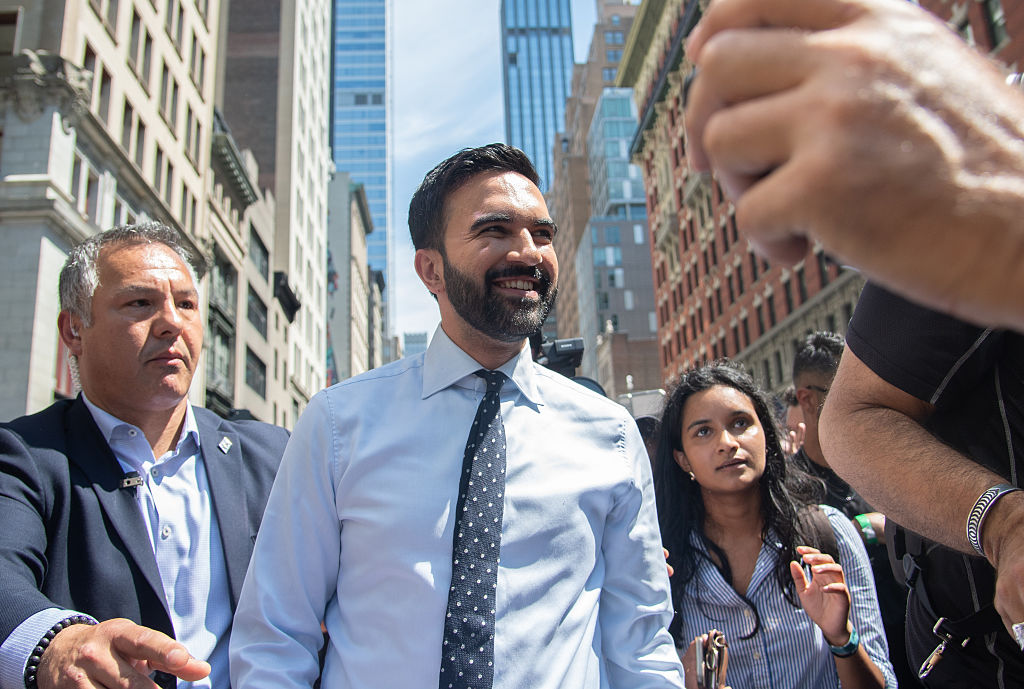Back at the desk
As you can see, if you are reading this, I have decided to bring Prufrock back thanks to the persuasive powers of Dominic Green and Matt Purple at The Spectator’s new World edition of the magazine. I’ll be sending the email three times a week (tell your friends to sign up here), writing a weekly column (read the first one), and hosting a weekly podcast. Send tips or suggestions to micah@thespectator.com. Hate mail should be sent straight to Dominic at editor@thespectator.com.
The miracle drug called poetry
If you read stuff online, you’ll learn, among other things, that poetry is a miracle drug — balm for all sorts of problems and conditions, irritants and itches. While I’ve always found ignorance a great source of comfort, apparently reading poetry can help you improve your awareness of the world and make you feel at peace. It is also very useful during “times of strife” and “fraught moments,” of which we have a fair share. Poems promote “positive identities and self-esteem.” Poetry is “invincible” but also strangely in danger (I’m still a bit confused about this). It helps us to “take better care of ourselves,” especially during pandemics, and explore identity “in new ways.”
Believe it or not, it can also help with climate change. Christina Thatcher explains how in The Conversation:
Climate change is widely recognised as the biggest threat of the 21st century. As it worsens, we can expect increased storms, heatwaves, droughts and other extreme weather events, which threaten the survival of much on this planet. Politicians have congregated in Glasgow at COP26 to discuss how they can work together to slow down and reverse some of this damage.
People following the conference will likely know a fair bit about climate change but, as poet Jorie Graham suggests, they may not “feel” it. Environmental activists have begun asking for help communicating the impact of the climate crisis to both politicians and the public. In other words: help people empathise with the impact of climate change so they will feel compelled to combat it.
In an interview for the Guardian, poet Roger Robinson said that “poems are empathy machines”. And research backs this up.
I, too, would like to use one of these empathy machines backed up by research. I still have a teenage daughter in the house who needs to feel a few things in particular.
A few serious points: First, while reading poetry affects us in some way, it is not at all clear exactly how it affects us. It may be that poetry “changes” you. It may also be that it doesn’t or that it changes you for the worse. Second, to say that poetry consoles (which it does) does not mean it makes you feel “better about yourself” or tells you that things will get better soon. It consoles for the most part by telling the truth: life sucks and then you die, or something like that, which is a kind of comfort.
Something has gone strangely wrong when the only way we now write about poetry is in therapeutic or political terms.
In other news
Before the Bodley was one of the finest libraries in Europe, it was a mess: “In 1598, the University of Oxford received an extraordinary proposal. Sir Thomas Bodley, a retired diplomat and Oxford alumnus, offered to restore the dilapidated university library, entirely at his own cost. He promised to make the library ‘handsome with seates and shelfes and deskes and all that may be needful to stirre up other mens benevolence, to helpe furnish it with bookes.’ The library hall had stood vacant for several decades, its books removed during the upheavals of the Reformation, its furniture sold off in 1556. When Bodley turned his attention to the library, it was in use only as a lecture hall.”
The above excerpt is from Andrew Pettegree and Arthur der Weduwen’s new history of libraries. Brooke Allen reviews it in The New Criterion: “In their enlightening new study The Library: A Fragile History, the historians Andrew Pettegree and Arthur der Weduwen show that the . . . concept of the public library did not really bear fruit until the very end of the nineteenth century, and its survival far into the twenty-first, at least in the form we think of as a ‘library’—a place full of books—is far from certain.”
Michael M. Rosen reviews a new history of the English language, focusing on its bizarre rules: “If you’re curious about why we say Woe is me (instead of Woe am I), why we egg people on, why colonel is pronounced kernel, why multiple moose aren’t meese, and how come we say how come, this is the book for you. It’s also skillfully and charmingly illustrated by Sean O’Neill, Okrent’s frequent collaborator.”
Dostoevsky’s Crime and Punishment — the novel that set him on the path to literary fame and saved him from destitution — has been the subject of none too few works of criticism and biography. The latest is Kevin Birmingham’s Sinner and Saint: “Birmingham, author of a well-received ‘biography’ of Ulysses, pieces together the long genesis of Crime and Punishment, from Dostoevsky’s involvement in the 1840s with socialist utopians to his long imprisonment and exile in Siberia to the halting revival of his literary career in a much-changed St Petersburg. While Christofi sought to illuminate the life through the work, Birmingham sets himself the more familiar task of illuminating the fiction through the life, the historical and intellectual context and the author’s notebooks, which he uses to excellent effect. The way Birmingham pursues his goal, however, is far from conventional and seems inspired by Dostoevsky’s own middle-period style. His tone is urgent, restless and aphoristic: ‘A gambling win is like biting into hollow fruit’; his ‘seizures taught Dostoevsky about powerlessness in a way that even exile and prison could not’; ‘At times, the sheer adversity of his circumstances was invigorating.’ The result is an absorbing, thickly textured biography of Crime and Punishment that develops through fragments and shards.”
Why is Netflix facing so many defamation law suits — more, even, than any news organization? Eriq Gardner explains.
The California Life of Czesław Miłosz: “He would live in the Golden State for 40 years, from 1960 to 2000, but according to Czeslaw Miłosz: A California Life, Cynthia Haven’s deeply considered new biography of the poet, Miłosz’s move to America was predicated on a fundamental error. ‘In immigrating to the United States, and specifically to California in 1960,’ Haven writes, ‘he thought he was coming to the timeless world of nature. However, Berkeley was about to become a lightning rod for […] the world of change […] and he would be in the thick of it.’”
Photo of the Day: Valère Basilica

























